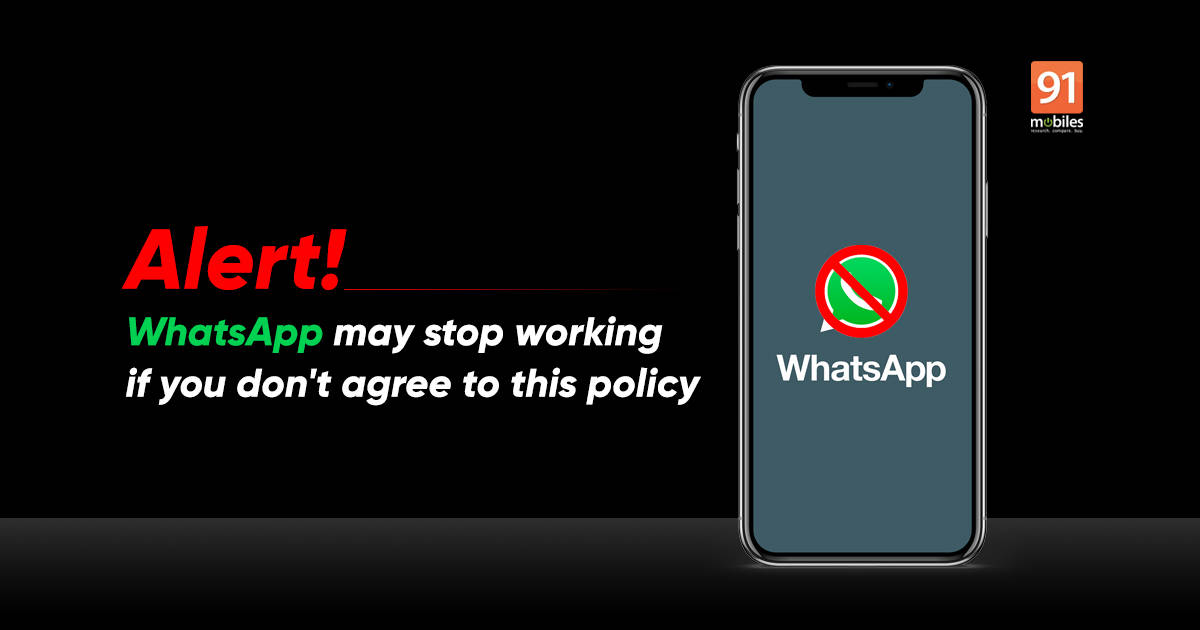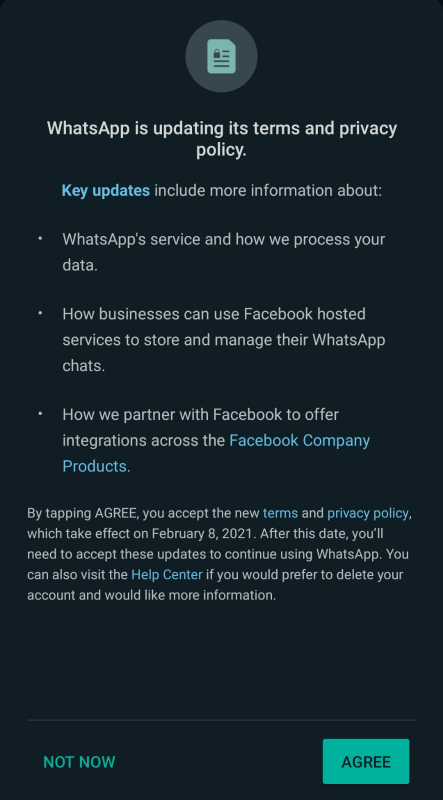
The new WhatsApp privacy policy and terms of services that make it mandatory for users to share information with Facebook and its subsidiaries will go into effect this month. Those who don’t agree to them will be blocked out of major services of the social messaging platform, including the inability to send or read messages on the app. The policy was initially supposed to be implemented on February 8th. However, following the criticism faced, WhatsApp postponed it to May 15th to give ‘enough’ time for users to review the changes. Now that it seems like the new WhatsApp privacy policy is coming into force, we take a look at everything that has happened so far, including the Government of India questioning WhatsApp regarding the new policy and what will happen if you don’t agree to it.
Read more: How to delete WhatsApp account, group, messages, and more
Table of Contents
When will the new WhatsApp privacy policy update be implemented?
As stated above, the new WhatsApp privacy policy update was originally scheduled to be implemented on February 8th, 2021. The effective date was later extended to May 15th, giving users at least three months of time to properly review and accept the policy.
What will happen if the user does not accept the WhatsApp policy?
Unless WhatsApp decides to extend the date, users who won’t agree to the new privacy policy and terms of service by May 15th will lose the “full functionality” of the app. “For a short time, you’ll be able to receive calls and notifications, but won’t be able to read or send messages from the app,” as per WhatsApp. That said, your account won’t be deleted unless it remains inactive for more than 120 days.
How to accept WhatsApp new policy

To accept the new WhatsApp privacy policy and terms of use, tap ‘Agree’ on the policy pop-up that appears on the screen when you log into the app. “By tapping AGREE, you accept the new terms and privacy policy,” WhatsApp.
That’s the only way you can agree to the update as of now. If you are not seeing the pop-up, chances are you have already accepted the new WhatsApp policy.
Read more: Don’t like the new WhatsApp privacy policy? Here are 5 WhatsApp alternatives to consider
The controversy behind WhatsApp privacy policy
Earlier this year, WhatsApp quietly tweaked its privacy policy and terms of services and informed users about it via a notification, which said ‘accept these updates to continue using WhatsApp’. The update included a better integration of WhatsApp with Facebook and its other services to broaden its e-commerce plan, using user details such as phone numbers, device ID, rough location, and transaction data, among other things. While it was meant mainly for business, several users mistook the step as an invasion of their privacy. Additionally, there were memes and general consensus that WhatsApp and its parent company Facebook is trying to see the content users share with family and friends, with the new policy change. This also led to the popularity of Signal, Telegram, and other WhatsApp alternatives.
Read more: Telegram update: How to move WhatsApp chats to Telegram
WhatsApp later issued a clarification that the new policy affects only your communication with businesses. Your personal chats and calls will remain end-to-end encrypted, as before, which means neither it nor Facebook will be able to see users’ private messages or hear their calls. The company further tried to clarify that it does not keep logs of who people message or call, as well as their shared location (neither, can Facebook), and share users’ contacts with Facebook. This does not mean that WhatsApp doesn’t share any information with Facebook.

The WhatsApp privacy policy states that the content you share with businesses may be visible to several people in that company as well as with third-party companies that the business works with (including Facebook). It not only shares all the conversations you have with a third-party service provider but chats logs to see what you buy, transaction value when you buy certain products the most, etc. The information is then said to be used to create targeted Facebook ads to drive sales for the business.
“The information we share with the other Facebook companies includes your account registration information (such as your phone number), transaction data (for example, if you use Facebook Pay or Shops in WhatsApp), service-related information, information on how you interact with businesses when using our Services, mobile device information, your IP address, and may include other information identified in the Privacy Policy section entitled ‘Information We Collect’ or obtained upon notice to you or based on your consent,” WhatsApp wrote in an FAQ page — providing clarity on its data sharing with Facebook and its subsidiary companies.
WhatsApp-Indian government face-off
That said, the Indian government is trying hard for WhatsApp to reconsider its privacy policy. Back in January, the government’s technology ministry sent a letter to the popular chat application requesting to withdraw the privacy policy update as it finds that Indian users aren’t given a choice. This was followed by a case against WhatsApp and Facebook in Supreme Court. Separately, India’s trade fair trade regulator CCI (Competition Commission in India) has ordered a probe into WhatsApp’s new privacy policy.
“The Commission is of prima facie opinion that the ‘take-it-or-leave-it’ nature of privacy policy and terms of service of WhatsApp and the information sharing stipulations mentioned therein, merit a detailed investigation in view of the market position and market power enjoyed by WhatsApp,” the CCI had said. For those unaware, WhatsApp is among the most used messaging apps in India, with around 53 crores users, as per the data shared by the company in February. The closest rival was YouTube, which had 44.8 crore users.
It’s worth mentioning that there are no changes to WhatsApp’s data-sharing practices in Europe arising from this update. “WhatsApp does not share European Region WhatsApp user data with Facebook for the purpose of Facebook using this data to improve its products or ads,” WhatsApp’s director of policy for Europe Niamh Sweeney said in a tweet. The changes apply to regions outside Europe. In case you were wondering why Europe gets the option to not have data shared with Facebook, it’s due to the strict GDPR (General Data Protection Regulation) that protects its citizens from misuse of their private data.

















